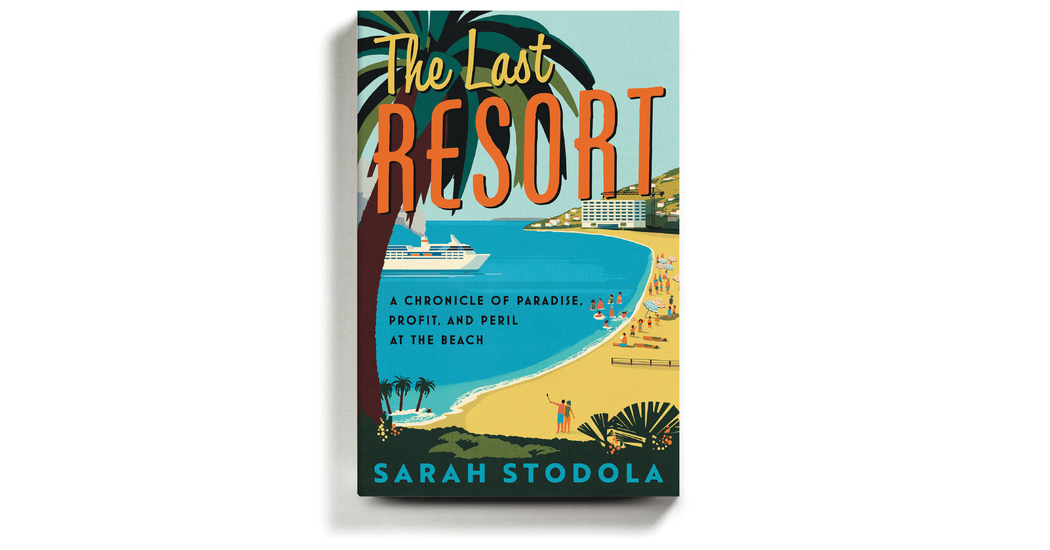
THE LAST RESORT
A Chronicle of Paradise, Profit, and Peril at the Beach
By Sarah Stodola
Illustrated. 341 pages. Ecco. $27.99.
Publishing a book about beaches in the season of the “beach read” is a bold and meta move, like when Kramer made a coffee-table book about coffee tables on “Seinfeld.”
The conventional wisdom is that readers want something light and unchallenging for their summer vacations, something they don’t mind smudging with Coppertone and leaving behind at the rental house. Sarah Stodola’s “The Last Resort,” its title echoing Cleveland Amory’s classic about high-society playgrounds, is definitely not that kind of book. Indeed it aims, in well-intentioned, widely researched and somewhat scattershot fashion, to make you profoundly uneasy about the very act of visiting the beach.
Why are you even going, anyway? For much of human history, Stodola reminds us, the seaside was considered a deeply uncomfortable and perilous place. In the 18th century, dubious seawater “cures” — like flushing the eyes or repeated dunking — were promoted in the West. But beaches were long tolerated rather than enjoyed, resorts there a lower-altitude parallel to the kind of sanitarium in Thomas Mann’s “The Magic Mountain.” They also feature in literature and movies, probably more than mountains do: Mann’s “Death in Venice” and F. Scott Fitzgerald’s “Tender Is the Night” flash immediately before the eyes. “Splash.” “Jaws.”
The beach, rebranded by Hollywood and real estate developers as an adult playground — it makes a great set, in art and life — nonetheless still carries a vague sense of impending danger. The sharks might be circling. The merciless sun beats down. The big wave could hit. And even before Covid, the tourism trade was vulnerable to outbreaks of disease and violence. “It’s one of the few industries,” Stodola writes, that requires its consumers “to show up in person to the place of manufacture.” And those consumers are fickle; their idea of “paradise,” denoted by palm trees and cocktail paper umbrellas, all too portable.
The biggest danger, Stodola darkly intones, throwing down plenty of statistics, is humans themselves. They overdevelop, recklessly dump plastic and commit great violence to delicate marine ecosystems. The earth is warming; sea levels are rising and established shorelines are being reshaped when they’re not disappearing entirely. And yet many travelers persist in pouting only about the immediate forecast. “There’s a thing about any extreme weather event being dismissible as a freak occurrence,” Stodola writes, “and then there’s our current deluge of extreme weather events that makes it harder to ignore that the center is not holding, to borrow a phrase from Didion, who borrowed it from Yeats.”
There’s a lot of borrowing in “The Last Resort,” and the bibliography may divert you quickly to the more focused histories Stodola consulted, like Mark Braude’s “Making Monte Carlo.” Her glancing forays into race relations brought to mind Russ Rymer’s more substantive “American Beach: A Saga of Race, Wealth, and Memory.”
Stodola, whose previous book was “Process: The Writing Lives of Great Authors,” and whose own writing life includes some amount of luxury travel (she founded and edits an online magazine called Flung), does fruitfully dig up a 1980 essay by a geographer named R.W. Butler. In “The Concept of a Tourist Area Cycle Evolution: Implications for Management of Resources,” Butler identified half a dozen stages, Kübler-Ross-like, in a resort’s life cycle, including Stagnation, Decline and possibly Rejuvenation. (“Tulum today is textbook Consolidation Stage,” Stodola writes of the Mexico municipality, which has become clogged with sargassum and hipsters.) She does a good back-and-forth analysis of why Bali, Indonesia, has become a major destination while nearby Nias has struggled.
Still, you have to chuckle when a little girl among a group of village children solicits a photograph from Stodola’s partner, Scott, and then one of the children holds up a middle finger just as he’s taking the shot. This critic didn’t feel quite that level of hostility, but the disorienting number of places Stodola alights, the number of vegan dishes and drinks she reports ordering, some at swim-up bars — an old-fashioned on the terrace of the Hotel du Cap Eden Roc in Antibes, France; Absolut and juice at the Naviti Resort in Fiji; “a totally decent glass of wine in Cancun” (which she deems in Stagnation Stage) — does make one scratch the head about what this book proposes to be, exactly; it tends to seem more last hurrah than last resort. “A nuanced understanding of the beach resort industry where none currently exists,” is what Stodola is attempting, while acknowledging that the carbon offsets she bought for all her long-haul flights “is not enough to rationalize the emissions.”
Mea Acapulco! (Where she enjoyed a melting frozen margarita at the El Mirador.)
Anyway, it’s time to retire the term beach read. We can do it here, now. “Read” (like “invite”) is better as a verb, and summer is precisely the season when readers should be “digging deep,” building castles in the air as well as the sand.




